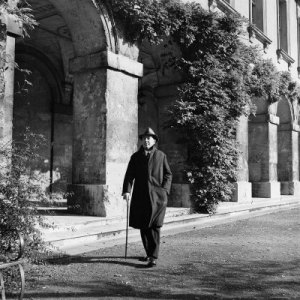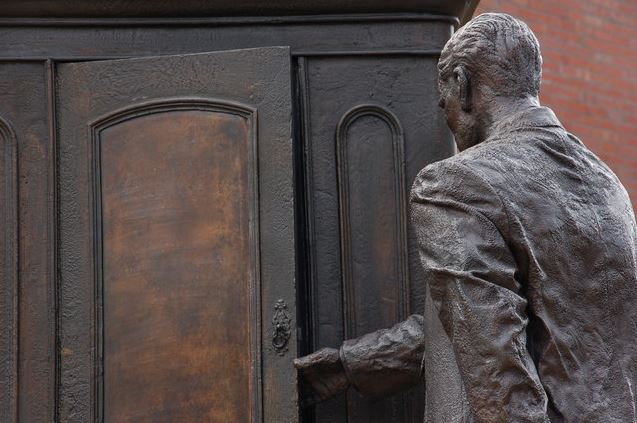While most of us associate C.S. Lewis with theological literature, the renowned author sounded the siren against progressivism’s clear dangers not only to the political rights and liberties of man, but also to our very perception of the reality of mankind…
 C.S. Lewis: World-renowned author, philosopher, theologian. Christian apologist. Mere mention of his name fills our minds with images of faith-based allegory, of lions, witches, and wardrobes, of rational defenses of the Christian faith.
C.S. Lewis: World-renowned author, philosopher, theologian. Christian apologist. Mere mention of his name fills our minds with images of faith-based allegory, of lions, witches, and wardrobes, of rational defenses of the Christian faith.
But political commentator and staunch opponent of progressive ideals?
That’s not what we think of when we think of C.S. Lewis.
And yet, while most of us associate Lewis with theological literature, the man who gave us Narnia also mounted firm opposition to the progressive-leftist ideals that swept swiftly across the world stage in his time. Lewis’s resistance to European progressivism was, first and foremost, a reflection on the reality of man’s nature, and the failings of progressivism to account accurately for man’s fallen state. He rejected progressivism’s assumption of man’s inherent goodness, of the state as an idol. Lewis succinctly described progressivism as “state worship,” predicated on the assumption of man’s inevitable rise to god-hood.
Entering onto the stage of the eighteenth and nineteenth centuries’ fixation on progress and the industrial revolution, a notable Lewis work on contemporary issues of his day (moral, spiritual, and practical) was his collection of essays called Present Concerns. This work, largely unknown to anyone but Lewis devotees, was recently discussed in this journal by scholar Gary Gregg. But perhaps the best insight into Lewis on progressivism and politics was a work of fiction—namely, his 1945 science-fiction novel, That Hideous Strength, the third and final book of his “Space Trilogy.” Covering a wide range of themes from marriage to human pride, the book’s plotline is centered on a progressivist organization called the National Institute for Co-ordinated Experiments (NICE), and its determination to use science to mend all of man’s ailments.
The story begins with the ordinary and quiet lives of the recently married Jane and Mark Studdock, but quickly expands to a provocative narrative. Mark, a new senior fellow and sociologist at Bracton College, soon finds himself in the “inner-circle” of the “Progressivist Element” at the college. In opposition to the “outsiders” and “obstructionists” (read: conservatives), the Progressivist Element soon starts formalizing a deal with the larger, nation-wide progressive organization, NICE, which intends to buy land from Bracton for its new facilities.
“The NICE was the first-fruits of that constructive fusion between the state and the laboratory on which so many thoughtful people base their hopes of a better world,” Lewis satirically noted, underscoring the progressive tendencies of state-controlled science, common to so many European (and American) governments of Lewis’s day. After being duped and flattered by Progressivist Element leader Lord Feverstone, Mark soon finds himself in a bittersweet relationship with NICE. Desperate for recognition and acceptance by the leadership at NICE, Mark becomes dependent on its employment, yet he remains unaware of his ambiguous job description.
Amid no formal duties and uncertain favor with the leadership of NICE, Mark resigns himself to working with Mrs. Hardcastle, the wily head of NICE’s secret police. His primary work, Mark realizes, is to write newspaper articles of dubious validity to press the progressivist agenda upon the public, to “camouflage it.”
Lewis skillfully captures the propaganda-like orientation of European progressivism: “It does make a difference how things are put,” argues Lord Feverstone. “For instance, if it were even whispered that the NICE wanted powers to experiment on criminals, you’d have all the old women of both sexes up in arms and yapping about humanity. Call it re-education of the mal-adjusted, and you have them all slobbering with delight that the brutal era of retributive punishment has at last come to an end.”
Despite initial hesitation to the task, Mark reluctantly begins writing propaganda for NICE, including one “report” that recommends the demolition of the quaint English neighborhood of Cure Hardy, describing it as old, dilapidated, insanitary, and overpopulated; conveniently, NICE needs the land for the purposes of its new facilities and intends to “get rid of” the old neighborhood in order to increase its “hygiene” and “efficiency.” Mark’s “journalistic” work continues as he covers up NICE’s involvement in a major riot in the nearby village, a devious crisis stirred up by NICE’s secret police in order to declare martial law in the town.
Despite Mark’s heavy involvement in progressive propaganda, this is not the only element of progressivism that Lewis includes in his novel.
Throughout the novel, Lewis clearly illustrates progressivism’s dependence on and worship of technology and knowledge, predicated on the assumption of man’s constant positive trend toward progress and enlightenment. Quite noticeably, NICE pursues change at all costs while credulously assuming that any departure from the past is a worthwhile endeavor. Its goal: “The scientific reconstruction of the human race in the direction of increased efficiency” by devotion to the “Technocratic and Objective Man.” Like the existing progressive regimes in Europe and America, Lewis’s NICE tends to elevate technology and knowledge as a god while depending on technocrats and “experts” to promote this technology-worship. Described by Lewis as “scientism,” NICE’s worship of technology and expertise manifests itself in the society’s obsession with scientific experimentation and the recruitment of suitable “experts.” This idolatrous worship of science climaxes in NICE’s submission to a scientifically re-engineered dead human head, with members of NICE ascribing divinity to the head as the “first… real God,” and taking orders from the bionic machine.
Lewis later warns of this dangerous scientism in government, cautioning that if we accept scientism in full, “we must give full weight to the claim that nothing but science, and science globally applied, and therefore unprecedented Government controls, can produce full bellies and medical care for the whole human race: nothing, in short, but a world Welfare State.”
And all of this, of course, is done in the name of “niceness.”
Throughout his work, Lewis clearly alludes to the Tower of Babel and the temptation of man to elevate himself as a deity and achieve such heights by use of his raw talent and knowledge alone. As Lewis scholar David K. Naugle notes, the title, “That Hideous Strength,” is based on a line in Sir David Lyndsay’s 1555 poem, Ane Dialog, where Lyndsay condemns the devilry of man and man’s arrogant aims in the Biblical story of Babel (Genesis 11). Lewis borrows a line from Lyndsay’s poem: “The shadow of that hideous strength, Six miles and more it is of length.” Indeed, in the preface to his novel, Lewis describes his work as a “tall story” that explores the world of man’s natural “devilry,” a sin that particularly intrudes into the public, political, and educational spheres. This same devilry found at Babel, argues Lewis, propels the progressivist’s insatiable desire for progress and human advancement.
And there are still other works by Lewis in which he confronts progressivism.
In his classic memoir, Surprised By Joy, an account of his steady conversion from atheism to Christianity, Lewis astutely coins a term to critique what he saw as progressivism’s “chronological snobbery.” This term described the “uncritical acceptance of the intellectual climate common to our own age and the assumption that whatever has gone out of date is on that account discredited.” Rather than evaluating value on the basis of truth or reliability, the chronological snob evaluates value on the basis of age, a practice common to both NICE and Western progressives of Lewis’ day. Progressivism, cautions Lewis, champions progress merely because it is supposedly forward-thinking; but as Lewis sagely observes in Mere Christianity: “Progress means getting nearer to the place you want to be. And if you have taken a wrong turn, then to go forward does not get you any nearer. If you are on the wrong road, progress means doing an about-turn and walking back to the right road.”
Lewis also offered a pragmatic critique of progressivist states in other works.
In his 1958 essay, “Is Progress Possible: Willing Slaves of the Welfare State,” Lewis prophetically warned of the tendency of progressives to arrest human liberties in the name of progress. He said that when “our whole lives” become the “business” of the state, we become slaves to the state and can no longer question the ideology of the state. Such were the hazards of “an increasingly planned society” and a “mother knows best” government. A primary solution to this danger, Lewis proposed, is “an education not controlled by government.”
C.S. Lewis mounted an impressive condemnation of the progressive state and its radical spread in Europe during the twentieth century. While brutal leaders like Lenin and Stalin, and eventually tamer socialist leaders like the U.K.’s Clement Attlee, all pursued human perfection through state control, Lewis sounded the siren against progressivism’s clear dangers: not only to the political rights and liberties of man, but also to our very perception of the reality of mankind. The great Christian writer and apologist produced a robust philosophical and political reproof of European progressivism during his time—a reproof to which Europe should have listened closer, and which we might consider listening to still today.
Written by Benjamin Hutchinson for The Imaginative Conservative ~ April 2, 2018
 FAIR USE NOTICE: This site contains copyrighted material the use of which has not always been specifically authorized by the copyright owner. We are making such material available in our efforts to advance understanding of environmental, political, human rights, economic, democracy, scientific, and social justice issues, etc. We believe this constitutes a ‘fair use’ of any such copyrighted material as provided for in section 107 of the US Copyright Law. In accordance with Title 17 U. S. C. Section 107, the material on this site is distributed without profit to those who have expressed a prior interest in receiving the included information for research and educational purposes. For more information go to: http://www.law.cornell.edu/uscode/17/107.shtml
FAIR USE NOTICE: This site contains copyrighted material the use of which has not always been specifically authorized by the copyright owner. We are making such material available in our efforts to advance understanding of environmental, political, human rights, economic, democracy, scientific, and social justice issues, etc. We believe this constitutes a ‘fair use’ of any such copyrighted material as provided for in section 107 of the US Copyright Law. In accordance with Title 17 U. S. C. Section 107, the material on this site is distributed without profit to those who have expressed a prior interest in receiving the included information for research and educational purposes. For more information go to: http://www.law.cornell.edu/uscode/17/107.shtml
